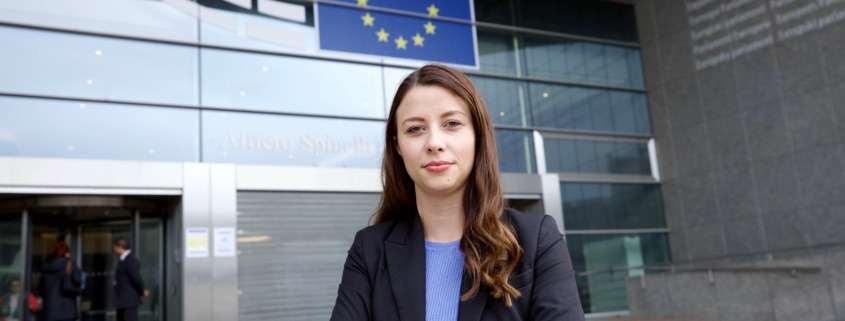Today, on 26 November 2021, MEP Irena Joveva was a guest of Radio Kum. As she approaches the halfway point of her term of office, she reflected on her past work and the challenges ahead. She commented on the social and political changes caused by the pandemic, and the European policies to manage the post-pandemic situation and the recovery, as well as on political developments in Slovenia.
Not long after the start of her term of office, the world was hit by the pandemic. MEP Joveva does not doubt the important the role of the European Union in tackling the crisis: “Although Brussels often seems irrelevant, it is everything but. It is precisely common action in all areas that has made and will continue to make it much easier for Member States to deal with the pandemic than we could have done individually.” It is regrettable, however, that the pandemic has also accelerated the spread of various highly dangerous ideologies, such as fascism, different forms of intolerance and the erosion of democracy, which even Slovenia is not immune to.
Over the past two and a half years, Joveva, a member of four committees, has been actively working on a number of areas. The Special Committee on Cancer drafted a motion for a European Parliament resolution on strengthening Europe in the fight against cancer. “An important objective of the first half of the term was the creation and adoption of NextGeneration EU, the Recovery and Resilience Facility, which is now integrated into the EU’s long-term budget. These funds will enable Member States to achieve a breakthrough and develop in the post-pandemic period,” she said, welcoming the fact that much more funding is directed to initiatives for the young. In the Committee on Culture, the work over the recent period has focused on the media, freedom of the press and government interference in Poland, Hungary and, unfortunately, also in Slovenia. A number of legislative solutions are in the pipeline — ranging from the European Media Freedom Act to the Digital Services Act and Digital Markets Act and perhaps soon the so-called anti-SLAPP legislation will follow aimed at preventing abuse of the legal system to silence journalists, NGOs and civil society.
The MEP finds the situation in Slovenia worrying: “Over the last year, the Slovenian Press Agency was a hostage of the Janez Janša Government. They wanted to bring the agency to its knees, gain the power to enforce their own editorial policies. They try to achieve the same with the personnel changes at the national television broadcaster.” Nor did the Twitter outbursts of the current government team go unnoticed in Europe, all of which led to a point where the European Parliament’s Civil Liberties Committee sent a delegation to Slovenia to examine the state of democracy.
“The report makes it clear that they are deeply concerned about the climate of hostility and deep polarisation in the country — which is precisely what Janez Janša is trying to achieve. And we have even come to the point where the European Parliament will be deliberating the first ever resolution on the situation in the area of fundamental rights and the rule of law in Slovenia, presumably in December. And no, this is not an attempt ‘to export’ domestic politics, rather it proves that it is clear to everyone what is happening and how dangerous it is.”
Joveva has also been critical of the European level, which, in her view, has been too slow to act and whose mechanisms are too rigid. Even in the case of the most serious violations of European fundamental values, the European Union does not apply its sanctioning mechanism – making the disbursement of European funds conditional on compliance with the rule of law.
The MEP also spoke about motherhood: “I have been very keen to become a mother, but it was not so easy and self-evident. This was my third pregnancy and my fourth child, the first one to be carried full term. This is why, when she was born, my happiness was all the greater. It is true, however, that this is a daunting task. Nothing can prepare you for this — all this love and unconditional dedication, or how hard it can be.” Even though her daughter is only a few months old, the MEP works full time, as no maternity leave is foreseen for MEPs. At present, she is able to work from home due to the pandemic, but she was critical of the reckless and sudden decisions by the President of the European Parliament, David Sassoli, who last month hastily abolished teleworking, only to allow it again later because of pressure from young MEPs. Still, Joveva intends to attend the December Plenary Session in Strasbourg with her daughter for the first time.
Finally, she called upon listeners to show confidence in science, progress and development. “Let us be friendly, understanding, tolerant and above all — responsible. And yes. Let us turn out and vote in elections. This is not only our right; it is our shared responsibility. So that in the end it is not others who decide in your stead,” she concluded.





Leave a Reply
Want to join the discussion?Feel free to contribute!